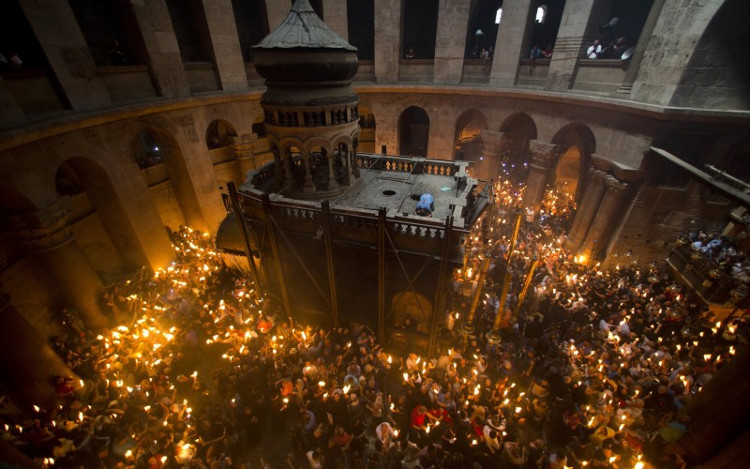Controversy about where to bury Jesus
The Church of the Holy Sepulcher in Jerusalem is just one of many places believed to be the final resting place of Jesus next to many other graves in India and Japan.
Church of the Holy Sepulcher, Jerusalem, Israel
According to Christianity, the body of Jesus was placed on a slab carved from a limestone cave after he was executed by the Romans on a Cross over 2,000 years ago. The cover over the stone is a work called Edicule which means "small house" in Latin.

Edicule building inside the Holy Sepulcher church in Jerusalem.(Photo: AP).
Decorated with oil lamps, pillars and large candlesticks, Edicule was built above the body of the anointed body, covered with linen and buried before his resurrection. Edicule is located inside the Church of the Holy Sepulcher, a few hundred meters from where Jesus was executed. Currently, scientists from Athens National University of Technology are embellishing Edicule and the tomb inside.
During the 60 hours of grave reconstruction, the researchers found that the tomb did not shift throughout history, while confirming the existence of a limestone cave behind the grave walls.
The ancient tomb was found by Queen Helena, the emperor of Constantine's Roman Empire. According to Socrates Scholasticus, 4th-century historian, Helena discovered the crucifix of the Lord crucified at the tomb door.
"We cannot be absolutely sure that the Church of the Holy Sepulcher is the place where Jesus was buried, but we are sure there are no more reliable places," said Dan Bahat, a Jerusalem archaeologist.
Tomb of the Garden, Jerusalem, Israel
Another burial site known as the Tomb of the Garden, discovered in Jerusalem in 1867, is also considered a burial place for Jesus. In the gospel of St. John there is a saying: ". where Jesus is executed, there is a garden .".

The Tomb of the Garden was discovered in Jerusalem in 1867. (Photo: Wikimedia Common).
In the 1980s, Israeli archaeologist Gabriel Barkay concluded that the grave has a popular design in the 7th-8th century. The groove to roll the stone at the grave door is actually a donkey trough, built more than a millennium after Jesus' death.
Although in the past few decades, many historians have expressed doubts about the authenticity of the tomb, which still attracts many believers from all over the world.
Talpiot Tomb, Jerusalem, Israel
Another hypothesis is controversial about the grave of Jesus referring to the tomb in the Talpiot neighborhood 5 km south of Jerusalem. This tomb was explored in James Cameron's 2007 documentary "The Lost Tomb of Jesus" . According to the film, during the bulldozing procession on the outskirts of Jerusalem in 1980, 10 bones containers were found that could contain the remains of Jesus and his wife and children.

Talpiot grave today is sealed with concrete.(Photo: Handout).
However, archaeologists and Bible scholars do not approve of the above hypothesis and the location is quickly forgotten. Today, the grave is sealed under a concrete slab in an unknown neighborhood while the remains are kept by the Israeli Antiquities Agency.
Roza Bal, Kashmir, India
For Muslims, the temple of Roza Bal in northern Kashmir province has important significance. The first person confirmed that Jesus was buried in Roza Bal, Mirza Ghulam Ahmad, Ahmadiyya Muslim founder, a branch of Islam developed in the 19th century. According to Ahmad, Jesus survived his execution and emigrate to India.

Scholars believe that Roza Bal temple has no connection with the tomb of Jesus.(Photo: Flickr).
In 2010, the temple used to be temporarily closed by Christians to get a DNA sample of the remains buried in the grave for testing. The unified study of the temple of Roza Bal was completely unrelated to the tomb of Jesus.
Kirisuto no haka, Shingō, Japan
The tomb is said to be the burial place of Jesus in Shingō, Japan, accompanied by a completely different account of the life of Jesus. The local Sajiro Sawaguchi family affirmed that they were descendants of Jesus. According to them, Jesus came to Asia at the age of 21 to pursue knowledge and theology. He returned to Judea when he was 33, but was arrested for preaching. A brother of Jesus was guilty and died for Him on the Cross.

The tomb is said to be the place to bury Jesus in Japan.(Photo: AP).
Jesus returned to Japan, became a farmer and married a Japanese woman named Miyuko. He had three daughters and died at the age of 106.
"We do not claim this story correctly or what is written in the Bible wrong. All we can say is that this is an interesting ancient legend and depending on who comes here to decide to act. how to solve it , "the BBC quoted an elder in the village.
- Controversy around the body of Jesus' corpse box
- Admire the true content of Jesus
- Controversy around the real life role of Jesus
- The body of the skeleton reveals the life and death of Jesus
- The search for the living descendant of Jesus
- The shape of Jesus' tree was worshiped by Argentines
- Research reveals the shape of Jesus
- Determining the day when Jesus was executed?
- Controversy around the
- Found the tomb of Jesus?
- Ancient tomb marks prove that Jesus once had a wife and son
- Inside the church contains the tomb of Jesus
 Discovered an ancient centipede fossil 99 million years old
Discovered an ancient centipede fossil 99 million years old Discovered bat-like dinosaurs in China
Discovered bat-like dinosaurs in China Discovered a 200-year-old bronze cannon of the coast
Discovered a 200-year-old bronze cannon of the coast Discover 305 million-year-old spider fossils
Discover 305 million-year-old spider fossils